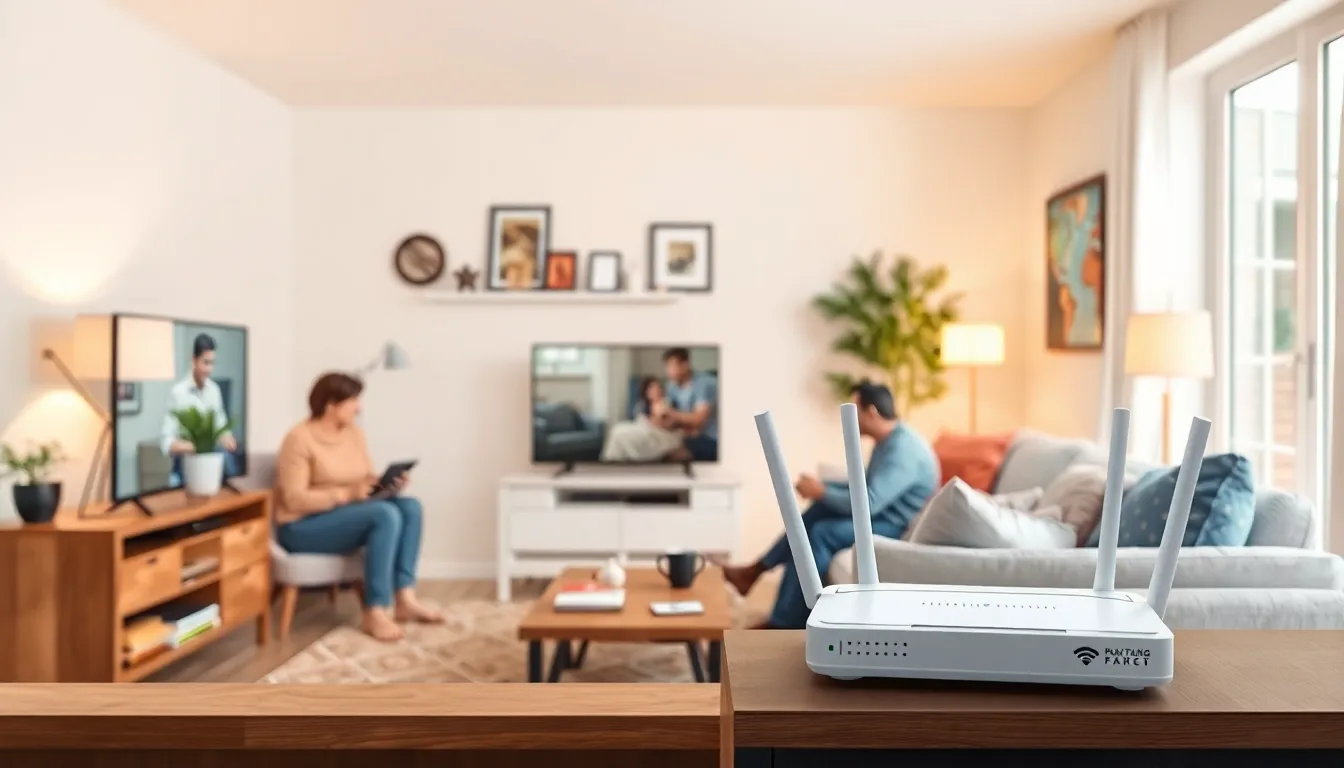In today’s tech-savvy world, a reliable home network isn’t just a luxury; it’s a necessity. Imagine trying to stream your favorite show while your Wi-Fi is slower than a tortoise on a treadmill. Frustrating, right? Home networking services are here to save the day, ensuring that every device in your house runs smoothly and efficiently.
Table of Contents
ToggleOverview of Home Networking Services
Home networking services encompass a variety of solutions designed to enhance connectivity and efficiency within residential environments. These services include network installation, configuration, and management, addressing each household’s unique requirements.
Wi-Fi setup remains one of the most sought-after services, ensuring reliable connections for all devices, from smartphones to smart TVs. Installation may involve placing routers strategically for optimal coverage, thus eliminating dead zones in the home. Configuring the network settings guarantees secure access and optimal performance, allowing users to stream videos without interruptions.
Network troubleshooting is another critical aspect of home networking services. Professionals can diagnose issues like slow speeds or connectivity drops quickly, resolving them to restore smooth operation. Offering ongoing support, many services provide monitoring solutions, alerting homeowners to potential problems before they escalate.
In addition to basic connectivity needs, many home networking services integrate smart home devices. Focusing on interoperability, these setups allow devices such as thermostats, lighting, and security cameras to communicate effectively. Customer satisfaction increases significantly when smart systems operate seamlessly together.
Home networking services are essential for modern households, providing stability and speed. Whether through installation of high-quality routers or advanced troubleshooting assistance, these services empower users to maximize their home networks and enjoy uninterrupted access to technology.
Benefits of Home Networking Services

Home networking services offer various advantages that significantly improve daily technology use. These benefits include enhanced connectivity and improved security.
Enhanced Connectivity
Enhanced connectivity leads to seamless internet access throughout a home. Home networking solutions ensure devices like smartphones, tablets, and smart TVs connect without disruption. Installing multiple access points or range extenders eliminates dead zones, providing strong signals in every room. Smart devices benefit from continuous connectivity, enabling reliable operation for security systems, lighting, and thermostats. Additionally, network management tools allow users to prioritize bandwidth allocation, ensuring important tasks like video streaming receive the necessary resources. Overall, an optimized network setup enables every household member to stay connected with minimal interruption.
Improved Security
Improved security remains a top priority for home networks. Implementing professional networking services enhances protection against cyber threats. Reliable services often include robust firewall settings to block unauthorized access. Regular software updates safeguard devices against vulnerabilities, while secure password protocols minimize risk. Advanced security features, such as guest networks, separate personal devices from visitors, reducing exposure to potential threats. Monitoring services can detect unusual activity, allowing for timely responses to possible breaches. Investing in home network security ensures families enjoy a safe online environment while using various smart technologies.
Types of Home Networking Services
Home networking services encompass various solutions to meet different connectivity needs. Understanding these options helps in choosing the right setup for any household.
Wired Network Solutions
Wired network solutions involve physical cabling to connect devices directly. Ethernet cables typically provide faster and more stable connections compared to wireless options. Professionals install these networks to ensure optimal placement of routers and switches. Fiber optic, coaxial, and twisted pair cables are commonly used types. Businesses and gamers often prefer wired connections for latency-sensitive activities. Multi-device households benefit significantly from the reliability offered by wired networks.
Wireless Network Solutions
Wireless network solutions rely on radio waves to connect devices without cables. Wi-Fi is the most common form of wireless networking, enabling easy connectivity for devices like smartphones, tablets, and laptops. Installation services include setting up routers and access points to expand coverage throughout the home. Modern solutions feature dual-band and tri-band systems to manage network traffic efficiently. Smart home devices easily integrate into these networks, enhancing interoperability. Wireless options provide flexibility and convenience, accommodating mobile lifestyles.
Choosing the Right Home Networking Service
Selecting the right home networking service ensures optimal performance and satisfaction. Understanding personal requirements aids in making informed decisions.
Assessing Your Needs
Evaluating individual needs forms the foundation of choosing a home networking service. Consider the number of devices used simultaneously, as homes with multiple smartphones, tablets, and smart TVs require more robust solutions. Bandwidth demand is another crucial factor; heavy users may prioritize high-speed options for video streaming or online gaming. Additionally, whether the home is a single-story or multi-story influences the network setup, as larger spaces may necessitate advanced configurations for coverage. Identifying specific features like smart home device integration or parental controls also increases the overall utility of the chosen service.
Evaluating Service Providers
Analyzing available service providers involves comparing offerings to find the best fit. Start by checking provider reputations, which often include customer reviews and service reliability ratings. Examine service plans to ensure they accommodate specific needs like bandwidth speed and support for smart devices. Cost also plays a role; consider ongoing fees versus initial setup expenses for wired and wireless options. Confirm the availability of customer support, as quick assistance during connectivity issues enhances user experience significantly. Finally, look into any long-term contracts, as flexibility can be a deciding factor for many households.
Investing in home networking services is essential for achieving a seamless and secure online experience. With the increasing reliance on technology for work and entertainment, a well-configured network can significantly enhance connectivity and performance.
Professional services not only optimize Wi-Fi coverage but also ensure robust security measures are in place to protect personal information. By choosing the right service provider and understanding individual needs, households can enjoy uninterrupted access to their devices.
Ultimately, effective home networking lays the foundation for a smarter and more efficient living environment, making it a worthwhile investment for any modern home.













